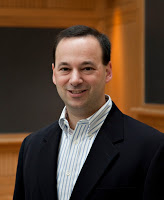- Public Policy
- Leadership
- Funding
- News & Events
- About the Center
Back to Top Nav
Back to Top Nav
Back to Top Nav
Back to Top Nav
Rockefeller Center Director Andrew Samwick provides commentary on a variety of issues in the Direct Line, which is published at the start of each term.
Personally and professionally, I enjoy the political season but acknowledge that New Hampshire's privileged status is part of a much larger system that aims to elect the best leader as President. During each election cycle, difficult questions are raised about whether according a small state with less racial and socioeconomic diversity than the nation as a whole such a prominent position serves the ultimate goal well.
In my opinion, the state's small population is in fact an advantage. If the more populous states had the earliest primaries, lesser-known candidates would have a difficult time competing across the whole state, and the election results might well be insurmountable for those who do not win. The issue of diversity is more compelling. If some candidates appeal differentially to different groups, and if New Hampshire's early primary makes its results unduly influential in the nominating process, then its privileged status may not be contributing to the best eventual outcome. Perhaps these concerns have been addressed, however, as contests in Nevada and South Carolina will now be closer in time to the Iowa caucus and New Hampshire primary.
I confess that bigger issue for me during this primary season is the exceedingly early start to the process and the planned televised debates from New Hampshire in early April 2007. While I have no objection to televising political events, the idea of putting the candidates next to each other so early in the campaign, to trade one-minute sound bites about complex policy issues, seems ill-advised.
One of the most interesting aspects about the New Hampshire primary is how much it depends on retail politics—events in small venues with each of the candidates away from the intense media circus of made-for-television events. I think the process actually helps develop the candidates for the national stage and is the best justification for continuing the state's first-in-the-nation primary role. Putting the candidates on television this soon runs the risk of our selecting the naturally telegenic before letting the process of retail politics do its good work.
There are approximately nine months between these televised debates and the New Hampshire primary and about the same amount of time thereafter before the general election. We would lose very little in waiting until the fall before distorting the campaign to accommodate nationally televised debates. What we would gain is an electorate that is enthusiastic about the political process rather than exasperated by it and candidates that had built their platforms in front of people, not cameras. We would also be advantaged by six months of the media spotlight focused on the people actually governing in Washington.
 Andrew A. Samwick is the Director of the Nelson A. Rockefeller Center for Public Policy and the Social Sciences, the Sandra L. and Arthur L. Irving '72a, P'10 Professor of Economics at Dartmouth College, and a research associate of the National Bureau of Economic Research. In 2003 and 2004, he served as chief economist on the staff of the President’s Council of Economic Advisers.
Andrew A. Samwick is the Director of the Nelson A. Rockefeller Center for Public Policy and the Social Sciences, the Sandra L. and Arthur L. Irving '72a, P'10 Professor of Economics at Dartmouth College, and a research associate of the National Bureau of Economic Research. In 2003 and 2004, he served as chief economist on the staff of the President’s Council of Economic Advisers.